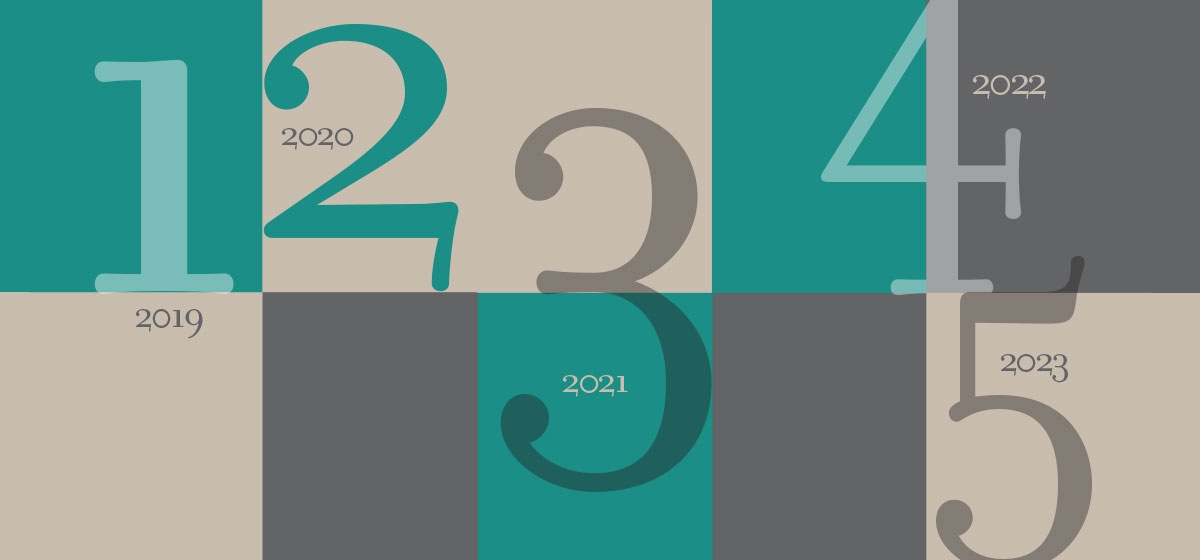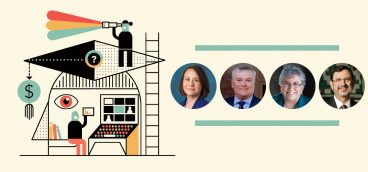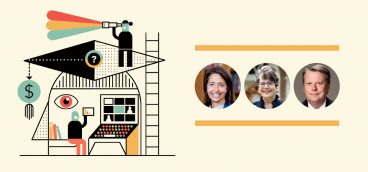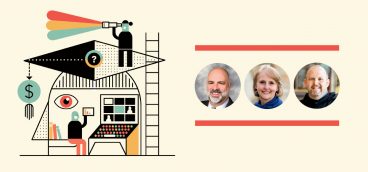The Next Five Years and Beyond

For this special feature, we invited the presidents of the region’s leading institutions of higher education to respond to the following: What will be your strategy in the next five years to address the needs of students in the future? Their responses follow.

CALIFORNIA UNIVERSITY OF PENNSYLVANIA, Geraldine M. Jones
California University of Pennsylvania gives students the teaching and tools required for success now and throughout their careers. Because Cal U has a special mission in science and technology, we embed digital literacy and technology skills into our academic programs—not just in STEM majors, but in business, education, human services and liberal arts, too. We intend to continue this strategy so Cal U students can graduate with the skills and flexibility they’ll need to thrive in a rapidly changing world.
We also recognize that our student population is shifting, with fewer teens graduating from the region’s high schools and more adults seeking higher education. To address the needs of learners at all stages of life, Cal U will continue to balance the number of online vs. on-campus degree programs we offer. Convenient access to affordable, high-quality online education undoubtedly has benefits, especially for working adults, yet there is also tremendous value in face-to-face learning and the campus-based college experience. We look carefully at workforce demands, as well as student needs, as we adjust our program inventory. In the years ahead, decisions about whether new academic programs will be offered online or on campus will certainly be in play.

CARLOW UNIVERSITY, Suzanne K. Mellon
Over the next five years, students will need to acquire an increasingly diverse set of skills and competencies across multiple disciplinary areas. Adults are returning to higher education today at varying times in their lives—sometimes to complete a degree or in mid-career, in response to changing demands in the workforce. Carlow will continue to leverage our ability to be nimble and responsive to factors that influence what students need, how they need it and when.
We will continue to build on our strengths as a Catholic university providing a values-based education with an emphasis on developing career-ready ethical leaders. Strategically, we will build on our areas of excellence, on our strengths in the health and natural sciences, and in applied areas within the workforce. The College of Professional Studies will be further building on partnerships we have with over 200 businesses to deliver an educational experience tailored to adult learners.
The careers and jobs of the future are changing. A liberal arts education is needed more than ever as the foundation for students who will have multiple careers in their lifetimes. Students need to see themselves as lifelong learners, adding to their education throughout their careers. Carlow will continue to develop programs that align with the needs in the workforce while serving the common good of society.

CARNEGIE MELLON UNIVERSITY, Farnam Jahanian
As educators, we have a growing responsibility to prepare students for a constantly evolving future—one that is being catalyzed by unprecedented advances in technology and automation. At Carnegie Mellon, we are reimagining higher education for this age of disruption. For example, we are embracing the digital revolution through academic programs that include a first-of-its-kind undergraduate major in artificial intelligence and also investing in new educational innovations through the science of learning. But technology is only one part of the picture. At the same time, we are also pioneering new interdisciplinary programs that better serve students’ interests and embedding continuous learning in the “human” skills that will only increase in demand as automation matures—skills that include communication, critical thinking and collaboration.
Ultimately, given today’s rapid pace of change, a new paradigm based on lifelong learning is emerging. With this in mind, we are considering new models of engagement with our internal and external stakeholders, including more personalized learning pathways for our students and closer connections with the private sector and community colleges.
The future is arriving faster than ever before. I believe we are uniquely positioned to lead in this transformation of higher education.

CHATHAM UNIVERSITY, David Finegold
At Chatham University, we are preparing to address the needs of students today and in the future through the following five focus areas. First, our academic and mission focus on sustainability is about helping to prepare students to understand and address climate change—among the greatest challenges this new generation will face. Second, we are continuing to develop degrees in emerging fields such as our new degree programs in immersive media, data analytics and healthcare informatics. Third, we are investing in online learning to expand degree and certificate options that help working adults advance their careers and serve those who started but didn’t complete a degree. Fourth, we are working to lower costs through initiatives such as membership in the Low-Cost Model Consortium and a pilot program that offers students paid summer research, low-cost study abroad experiences, and online learning. Fifth, we are partnering with employers to develop courses and stackable certificates tailored to their workforce needs. Throughout all these initiatives, Chatham holds fast to our mission of combining strong professional preparation with liberal arts skill-building in order to prepare students to adapt, grow and thrive as the labor market evolves at an ever-faster pace.

CLARION UNIVERSITY, Dale-Elizabeth Pehrsson
Clarion University faculty continuously monitor trends in employment, education, business and industry to design programs to equip our graduates with cutting-edge skills and knowledge needed for their careers. We develop majors, minors, concentrations and certificates that prepare students for work and/or continuing education and satisfy workforce demand for graduates.
Clarion offers stackable credentials that allow students to build on prior education. Many of the programs—undergraduate, graduate and doctorate—are completely online to provide flexibility for students with work and family responsibilities. Online programs help students climb the educational ladder, earning advanced degrees while they continue to work in their field.
The university regularly partners with industry leaders and economic development organizations. This spring, Clarion, in partnership with regional entities, was awarded a $1.1 million grant through Appalachian Regional Commission’s Partnerships for Opportunity and Workforce and Economic Revitalization. The grant’s goal is to improve the lack of educational and economic opportunities.
Clarion University leads Pennsylvania’s State System of Higher Education in accreditation, both national and international. Accreditation ensures that Clarion has successfully undergone a rigorous review conducted by peers in the education community and that we have the resources, credentials and commitment to provide students with a first-rate, future-focused education.

DUQUESNE UNIVERSITY, Ken Gormley
At Duquesne, we’re actively redesigning our curriculum to make it meaningful for today’s digitally and globally engaged students. They’re hardworking, entrepreneurial and eager to learn. They embrace technology in ways that are unmatched by previous generations. That’s why we recently announced the creation of the Rangos Prizes. Supported by philanthropist, visionary, and longtime friend of Duquesne John G. Rangos, Sr., these prizes will help inspire students and faculty to propose innovative new classes, course materials and academic programs for a new era. These will incorporate technology—courses such as one we’ll debut for freshmen this fall, called “Empathy and Civility in a Digital Age.” They will also emphasize civil discourse—sharing views on challenging topics with openness and respect. Duquesne was founded in 1878 by missionary priests who came to Pittsburgh to help recent immigrants and their families advance themselves through education. An integral part of that education is a firm commitment to ethical and moral principles. Our strategy for helping new generations of students become leaders is to connect these timeless core values with exciting and innovative academic programs, reimagining higher education for a new era.

EDINBORO UNIVERSITY, Michael Hannan
Students have a vision of the future and the will to build it. At Edinboro University, we push students as hard as they push themselves and inspire them to expect more.
College is a time for students to transform—their knowledge, their skills, their networks—their lives. We are committed to doing all that we can to help students become the best version of themselves. To that end, we will:
- Review our academic offerings in an ongoing way to ensure they meet student and employer needs.
- Further strengthen academic achievement from the very first days students step into a classroom by honing programming and meeting students where they are.
- Prioritize student well-being by providing the resources necessary for a fulfilling and healthy campus experience, both inside and outside the classroom.
- Continue to provide a strong, welcoming, respectful and inclusive campus culture that fosters personal growth and enriches the campus and broader community.
Throughout Edinboro’s history, we’ve created a place for those who strive—those willing to work, those willing to go further, those willing to aim for something greater. Like our students, Edinboro is a place with grit, a place that persists, realizing the work is never done.

GENEVA COLLEGE, Calvin L. Troup
As people who elect to study at Geneva—a Christian College that exists to equip students for faithful service to God and neighbor—students want their lives to count beyond self. They want to live meaningful lives for the good of others. And they want their life’s work to matter—they want to do meaningful work. These are not new aspirations, but prior generations of students could expect more stable professional paths that led to predictable growth and development. Today, technological automation and the globalization of life in advanced societies has created less stability and more uncertainty for students. To address these needs, Geneva will continue to offer state-of-the art majors in STEM disciplines, professional fields, and the liberal arts to prepare them for great jobs in today’s marketplace. But to prepare for a life’s work extends beyond a student’s first meaningful job—a good college education pays lifetime dividends. Therefore, Geneva’s strategy provides students with a robust academic core that equips them to navigate a constantly changing world with spiritual depth, mental agility and practical Christian wisdom.

GROVE CITY COLLEGE, Paul J. McNulty
The most successful and fulfilled leaders of tomorrow will possess outstanding technical skills and a wide range of soft skills, including creativity, empathy for the concerns of others, interpersonal communications and strong ethical character. Grove City College understands that students must be ready to do the work technology cannot do, work that is tied to the best of our human capacities. This is why our mission is to equip students for this world by staying firmly committed to excellent preparation for careers in engineering, health sciences, business, education, communications and dozens of other areas of study through, in part, our faith-based liberal arts curriculum.
We know that affordability will continue to be a big issue for families. Stewardship is one of our core values, and that’s why our tuition sticker price is less than half of our competitors. And while nearly every other school entices students with unfunded tuition discounts, Grove City provides only fully funded financial aid. This long-standing practice, combined with our independence from federal funding, places the college in a unique and fiscally sound position heading into the future. It also allows us to plan big, including building or renovating several facilities, to enrich our learning and living community.

LA ROCHE UNIVERSITY, Sister Candace Introcaso
A key strategy for La Roche University is to link our educational programming to support the needs of the region. This means continued expansion of healthcare, technology and science programming, at both the undergraduate and graduate levels. The Division of Natural and Behavioral Sciences is the fastest growing academic division at La Roche with undergraduate enrollment in STEM majors increasing 70 percent over the past 10 years. In order to sustain our growing enrollment in the sciences and maintain the successful outcomes of our students, we are investing $5 million to renovate our science center this summer with new state-of-the art laboratories, classrooms, common areas and faculty offices. The modern design will reflect today’s most effective learning environments. Additionally, the creation of the La Roche University Lifelong Learning Center will provide academic enrichment and other experiential learning opportunities that enhance the lives of local residents. And, finally, because we believe that athletics is an integral part of the college experience and a strong component of La Roche’s appeal to prospective students, we plan to expand our athletics program and will announce new varsity sports in the near future.

POINT PARK UNIVERSITY, Paul Hennigan
As educators, we must do more than teach content. The facts and figures of an academic subject are not sufficient to help today’s college students lead fulfilling, successful professional lives.
At Point Park University, we accept the challenge to ensure each graduate has the tools to succeed in the world. In addition to the core content of every major, we help our students gain the soft skills that employers are seeking and that will become even more important in the future. To be competitive, our workforce must have strong analytical thinking and communication skills. Employers are looking for people who can demonstrate the ability to research, process complex information and develop evidence-based arguments.
Point Park provides a coordinated, unified system of experiential learning, career-focused education and external partnerships that result in opportunities for work experience and professional development as well as intellectual and personal growth.
By also providing just-in-time education for those already in the workforce through short, highly focused certificate programs and noncredit courses delivered online and in person, we help today’s workers become more competitive in the current and future job market.
It is not enough to ensure students graduate. Our success is one that results in graduates not just job-ready but with a job already in hand.

ROBERT MORRIS UNIVERSITY, Chris Howard
Robert Morris University has always adapted to meet the needs of the professional workforce in the Pittsburgh region and beyond. That means providing students from various backgrounds with the tools they need to be competitive in an increasingly disruptive economy.
We’ve recently launched more certification programs for our traditional, full-time students, so they can earn digital badges and certificates to demonstrate to future employers they have the specific knowledge needed to make an immediate impact; and for mid-career professionals looking to burnish their skills. These include Amazon Web Services’ AWS Academy program; organizational leadership; nursing informatics; additive manufacturing; information security; and entrepreneurship, among others.
We also work directly with employers to customize professional and leadership development programs to help their employees advance their careers. The student of the future at RMU will not only be an 18-year-old freshman but also a 45-year-old middle manager improving her skills as she prepares to move into the C-suite.
Launching students into great careers also means making sure they finish on time. Thus, RMU has adopted a sophisticated predictive data analytics system that more quickly identifies high-risk students and allows faculty and other advisors to provide customized academic interventions. We want students to arrive and thrive—now and for the rest of their lives.

SAINT VINCENT COLLEGE, Br. Norman W. Hipps
Technology is growing by leaps and bounds, but we still need people to understand literature, hearts and values—to sort through what’s important to humankind. We must teach our students to be able to weigh sources of information and determine what is of value, to be excellent communicators, to be continuous learners who are capable of increasingly creative and critical tasks.
As automation and artificial intelligence improve, imagination, aesthetic judgment, and ethical and moral thought will be even more essential human inputs. While the technical skills needed to contribute to the advancement of our society have changed (think of the progression from calligraphy to typing, to computer programming, to artificial intelligence), that which is most necessary, useful and beautiful remains constant. Leaders who will create the future of our nation and the world need what students have needed in any age: a liberal education that ensures a mastery of critical and analytical thinking; written and oral communication; scientific and mathematical inquiry; and historical, cultural, philosophical and theological thoughts of the world’s traditions. Most importantly, they must simultaneously respect and value both the uniqueness and interconnectedness of different peoples, perspectives and realities.

SETON HILL UNIVERSITY, Mary C. Finger
Since our founding more than a century ago, Seton Hill University has been an entrepreneurial institution that has educated students for an ever-changing world. Seton Hill continues to be strategic in its efforts to meet the needs of our current and future students in numerous ways but particularly around academic program development. Our faculty has been working closely with regional business and community leaders to rapidly develop new academic programs and partnerships that meet workforce demands and are undergirded by a strong liberal arts core that provides students with the soft skills employers seek. New undergraduate programs in nursing, cybersecurity, global studies, and data analytics; a new master’s degree in education—innovative instruction; and additional MBA specializations in healthcare administration, forensic accounting and fraud examination, and project management are among the new programs Seton Hill has started offering in recent years as we have listened to the needs of employers. Over the next five years, Seton Hill will continue the rapid development of new academic programs that fit within our mission, meet the needs of the market and, above all, prepare our students for whatever career paths lie ahead for them.

SLIPPERY ROCK UNIVERSITY, William J. Behre
At Slippery Rock University, we believe education is an important lever for social mobility. To ensure the greatest number of young people, particularly those who might not otherwise be able to afford to do so, can have access to a life-changing education, SRU’s strategies will focus on affordability, accessibility, market needs and time to degree.
Pennsylvania ranks 48th in the nation in state support for higher education; as a commonwealth, we must do better. In the meantime, individual universities must do whatever they can to increase accessibility.
The decision by PASSHE’s board of governors to move away from a one-size-fits-all approach to tuition will allow SRU to tailor tuition and financial aid to its students. This is a very important step towards greater accessibility.
One of the greatest hidden costs of college is “year five.” We must help students graduate in four years. At SRU, we have staff whose sole role be to help students achieve this goal. It’s also vital that curriculum is offered in a manner that encourages students to graduate on time. By building a more robust financial aid structure and helping students graduate on time, we hope to extend access to a higher education for many Pennsylvanians.

THIEL COLLEGE, Susan Traverso
Over the next five years, Thiel will continue its 153-year commitment to making high-quality private higher education accessible to students from a wide range of backgrounds, including a high percentage of first-generation college students. Central to this strategy is supporting students as they strive to graduate and move into meaningful careers and graduate programs. New programs in environmental safety management, exercise science and allied health, as well as new graduate programs in speech language pathology and physician assistant will connect students to dynamic careers in and around our region. Thiel’s Pedas Center for Media and Communication will benefit from new investments in faculty, which will lead to new learning opportunities for students to gain experiences in the fields of digital information and sports media. New and renovated spaces in the college’s science and academic facilities will create enhanced classrooms, laboratories and collaborative spaces. The new 65,000-square-foot Wellness Center will provide health and wellness programs for both students and the community while also supporting competitive athletics programs. Building on Thiel’s legacy of educational excellence, a new Thiel is emerging—a student-focused and outcome-driven college—that serves the needs of a diverse student body and contributes positively to the economic well-being of our region.

WAYNESBURG UNIVERSITY, Douglas G. Lee
At Waynesburg University we are building upon our mission to help our students connect faith, learning and serving through a campus-wide initiative to cultivate the entrepreneurial mindset. Students will have opportunities to develop the important interdisciplinary skills needed for life after college.
In the first year, students are introduced to the entrepreneurial mindset and then provided multiple pathways to pursue their passions and develop key skills in critical thinking, communication, problem-solving, implementation and leadership.
Following that, targeted instruction and innovative experiential projects in courses across the campus will continue to prepare students to be forward-thinking change agents. Their ability to adapt to changes and expectations in the marketplace will be critical in the not-so-distant future of jobs.
Students in all majors are encouraged to pursue our new entrepreneurial leadership minor. This program is designed to enhance and complement every degree program. Students will learn conflict resolution, leadership skills, adaptability and skills needed to succeed in any career field.
In addition, providing our students with vocational pathways through internships, experiential projects, and the development of mentoring programs with working professionals contribute to our 99 percent post-graduation placement in jobs or graduate education.

WEST VIRGINIA UNIVERSITY, E. Gordon Gee
At West Virginia University, our priority is ensuring that people have the education and the skills needed to compete today. To increase educational access, we are partnering with peer institutions on projects such as “Powered by Publics,” a national initiative to close the achievement gap and produce more degrees by 2025. To better connect our graduates with jobs, we continue to introduce degree and certificate programs in high-growth areas, such as graduate certificates in business data analysis and data technology management. For example, our university is now offering a new online master’s degree in business cybersecurity, which the FBI has named the most wanted talent of the 21st century. We are advancing digitization and an entrepreneurial mindset through a business accelerator and other programs at our John Chambers College of Business and Economics. We are also preparing students for the burgeoning tourism industry through our new program in adventure recreation management.
We are not simply planning for the next five years but working to transform higher education. We are becoming even more student-centric. We are creating an inclusive and diverse community—one where everyone feels welcome and accepted. We are aligning academics with purpose. As a land-grant university, we are embracing our role as “the people’s university”—and preparing people to thrive in a changing world.




